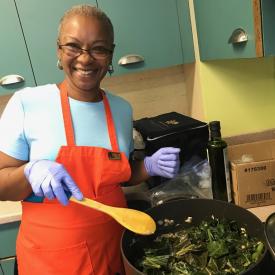In response to COVID-19, Oldways’ popular cooking and nutrition curriculum, A Taste of African Heritage (ATOAH), has largely moved online. To learn more about this transition and help instructors navigate the exciting new world of virtual teaching, we caught up with Paul O. Mims, a food writer and a nutrition instructor with the Food Trust in Philadelphia. Paul taught the six-week class series virtually in June and July 2020, during the period of quarantine and political unrest. Learn more about his experience building community through a virtual platform in our interview below, which has been edited and condensed for clarity.
Q&A with Paul O. Mims
Oldways: Many of our instructors are curious about how to make the transition to virtual classes. Can you speak to your experience with teaching the curriculum online?
Paul: The curriculum was very manageable and comprehensive. I didn’t have any issues with teaching this series regarding the curriculum. I think the staff working at the Philadelphia Free Library were helpful with the logistical aspect of facilitating the lessons via Zoom such as assisting with Q&A from the participants while I was cooking.
One thing I enjoyed about teaching this series was being able to add my personal background knowledge in nutrition to the lessons. A few times my participants would ask questions pertaining to certain concepts with the lesson and then this would allow me to go in depth with them. For instance, during the whole grain lesson there was someone who was curious about gluten in general, what it does for the body, and how it can influence on our dietary needs.
One thing I enjoyed about teaching this series was being able to add my personal background knowledge in nutrition to the lessons.
Oldways: Let’s talk logistics. Which platform did you use? How were you able to setup your devices or laptop to stream your cooking classes for the participants?
Paul: For instructing the course series, the library utilizes Zoom, because you can use screenshare, record, and chat with participants fairly easy.
I have a high-top counter in my kitchen, which allowed me to place both laptops on the counter and angled them towards myself and the cutting board place in front of me. Then I placed my ring light on a tripod that was settled behind my laptops for good lighting.
Oldways: Do you have any tips for future ATOAH instructors who plan to teach virtually?
Paul: Prep ingredients ahead of time before each lesson. I would always leave some time towards the end of class for Q&A and times during the cooking part. “I think you should do what works best for you in your own home”. For instance, I used stacked books to level my laptops and trust me there will be times of occasional awkwardness.
Oldways: How would you describe the demographics of your classes?
There were about 15-25 participants. I would say mostly (90%) female aged 35-60’s, racially and ethnically diverse. The majority were of African and Caribbean descent with a few Caucasian, southeast Asian and Latino participants.
Oldways: Which ATOAH recipes were most popular with your students?
Paul: The jollof rice, was very popular, many participants were excited to try the recipe for the first time due to its popularity with African cuisine and for individuals who had tried different versions of this recipe were looking forward to trying a healthier twist of this dish. The lentil recipe was also very popular with my group, which was a surprise for me since in the past with other courses I have taught, my participants would typically not enjoy cooking with lentils.
Oldways: Did you put your own personal twist on any of the recipes?
Paul: I had to alter the mango after chop recipe due to an ingredient mixup, but otherwise wise we stuck to the curriculum. My participants were adamant about purchasing the right ingredients for each recipe.
Oldways: What message do you have for people who want to live healthier but don’t know where to begin or aren’t confident in the kitchen?
Paul: When you’re cooking a dish remember to use ingredients that you actually enjoy eating. You are in charge of your own kitchen and the kitchen is not in charge of you.








